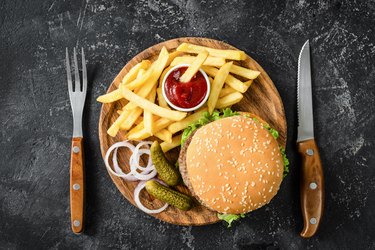
Appendicitis, or inflammation of your appendix, is the most common condition of the abdomen that requires emergency surgery, according to Johns Hopkins Medicine. Your appendix does not play a major role in digestion, so you may not need to make any lasting changes to your diet after an appendectomy. However, there may be foods to avoid after appendix surgery to limit abdominal pain and ease digestion. Talk to your doctor about your diet needs after surgery and during your appendicitis recovery time.
Tip
Foods you may need to avoid after your appendectomy depend on what your doctor recommends that you eat during recovery.
Video of the Day
Appendix Recovery Food
Immediately after waking up from surgery, your doctor will likely allow you to take small sips of water until you have fully recovered from the anesthesia. Once you are ready to eat, the University of Wisconsin Hospital says that you may want to start by eating easy-to-digest foods like soups and yogurt. After abdominal surgery, you may have a difficult time digesting regular food, and your doctor may suggest you follow a full liquid diet, which is made up of liquids and foods that turn to liquid at room temperature. Meals on a liquid diet might include smoothies, soups, shakes, and broth.
Video of the Day
On the liquid diet, you need to avoid solid food. That includes whole fruits and vegetables, meats, poultry, fish, eggs, beans, bread, cold cereal, rice, pasta, nuts and seeds, or any food that requires chewing. Your doctor determines when it's safe for you to start eating regular food after your surgery.
Avoid High-Fat Foods
Saint Luke's Hospital recommends starting off with bland, low-fat foods right after an appendectomy, like mashed potatoes, plain pasta, plain crackers, rice, cottage cheese, and bananas. The UC San Diego Medical Center says that eating heavy or fatty foods after surgery might give you diarrhea or make you feel nauseated. However, this is not the case for everyone, and many people may able to eat the same food as they normally do following appendix surgery.
Eat Plenty of Fiber
It's important to eat plenty of fiber after surgery, particularly if you are taking pain medication that can contribute to constipation. Foods rich in fiber include seeds, beans, various fruits and veggies, grains, and whole-grain bread and pasta options.
If you are struggling to eat much after appendix surgery and have constipation as a result, speak to your doctor about your symptoms to see what she recommends. She may be able to prescribe a stool softener and help you find food and drinks you can comfortably consume.
Read more: The 5 Best Vitamins To Take After Surgery
Ease Into a Healthy Diet
Appendicitis recovery time depends on what type of surgery you had. The American College of Surgeons Patient Education explains that there are two types of appendix surgery: A laparoscopic procedure done through a small hole or an open surgery done through a larger hole. Either way, you should be able to go home one day after your operation and recover well enough to participate in strenuous activity within 14 days.
Once you're on the road to recovery, eat a healthy diet rich in nutrients, such as eggs for protein and zinc and peppers for vitamin C. Eating fruit, vegetables, whole grains, beans, nuts and seeds can help increase your daily fiber intake so you meet your needs, which range from 20 to 35 grams of fiber a day.